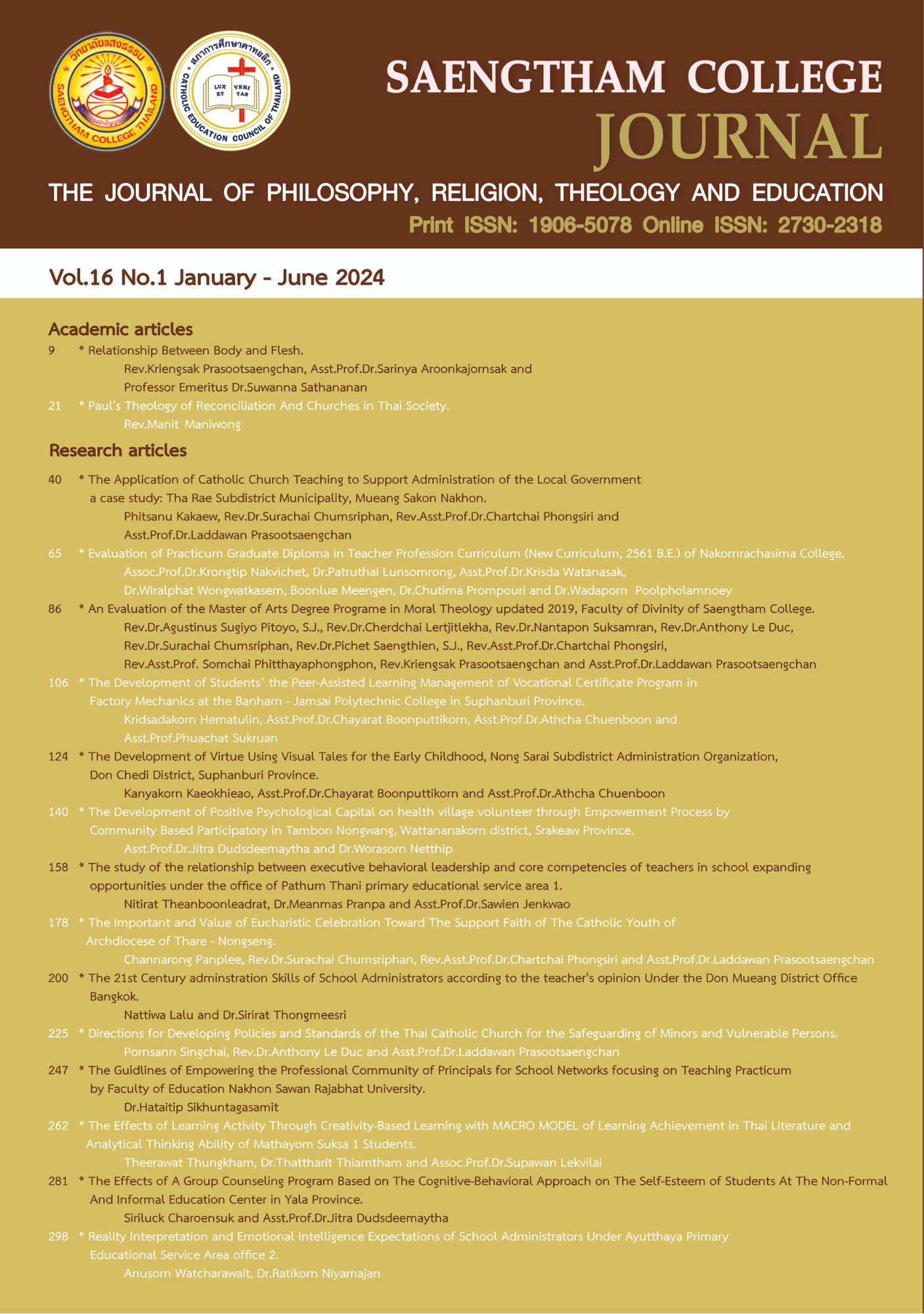The Effects of A Group Counseling Program Based on The Cognitive-Behavioral Approach on The Self-Esteem of Students At The Non-Formal And Informal Education Center in Yala Province
Main Article Content
Abstract
The objective of this research is to study the effects of a group counseling program based on the cognitive-behavioral approach on the self-esteem of students at the non-formal and informal education center in Yala Province, and with a quasi-experimental design. The sample group consisted of students from non-formal and informal education centers with low self-esteem scores (average score 1.00-2.00), a total of 36 individuals. They were divided by using simple randomization via drawing lots to assign into experimental and control groups, with 18 subjects in each group. The research instruments were the self-esteem assessment questionnaire, and a group counseling program based on cognitive-behavior approach, was conducted eight times. The data were analyzed using mean, standard deviation, and a t-test. The major findings were as follows: (1) after the experiment, students in the experimental group who participated in the group counseling program based on the cognitive-behavioral approach had significantly higher self-esteem scores than before joining the program, at a statistically significant level of .01; and (2) after the experiment, these students in the experimental group who participated in the group counseling program based on the cognitive-behavioral approach had higher self-esteem scores compared to the control group, and with a statistical significance of .01.
Article Details

This work is licensed under a Creative Commons Attribution-NonCommercial-NoDerivatives 4.0 International License.
- The academic and research articles, as well as the content and opinions expressed therein, published in Saengtham College Journal are solely the responsibility of the respective author(s).
- Articles published in Saengtham College Journal are the property of Saengtham College. Reproduction, modification, or dissemination of all or part of the content in any form without written permission from Saengtham College is prohibited.
- Articles published in Saengtham College Journal are protected under the Copyright Act.
References
กองบรรณาธิการ TCIJ. (2563). จับตา: 'การเลิกเรียนกลางคัน' ความเสี่ยงของอนาคตเยาวชนไทย. https://www.tcijthai.com/news/2020/03/watch/10418
ทินกร วงศ์ปการันย์ และ ณหทัย วงศ์ปการันย์. (2554). การวิเคราะห์องค์ประกอบเชิงยืนยันของแบบวัดความภาคภูมิใจในตนเองของโรเซนเบิร์ก: การศึกษาในนักศึกษาไทย. วารสารสมาคมจิตแพทย์แห่งประเทศไทย, 56(1), 59-71.
นิรมล สิริภัคนันท์. (2563). การจัดการศึกษานอกระบบด้วยแนวคิดการเรียนรู้โดยใช้เกมเป็นฐานเพื่อ เสริมสร้างการเห็นคุณค่าในตนเองของวัยรุ่นที่ออกกลางคัน. วารสารศรีปทุมปริทัศน์ ฉบับมนุษยศาสตร์และสังคมศาสตร์, 20(2), 174-186.
สมิทธิ์ เจือจินดาและวรรณนภา โพธิ์ผล. (2562). การพัฒนาโปรแกรมเสริมสร้างการเห็นคุณค่าของตนเอง สำหรับผู้สูงอายุในชุมชนเขตธนบุรีกรุงเทพมหานคร. Dhonburi Rajabhat University Intellectual Repository. https://cms.dru.ac.th/jspui/handle/123456789/1505
สำนักข่าวไทยแลนด์พลัส ออนไลน์. (2562). กศน. ชายแดนใต้ ขับเคลื่อนแก้ปัญหาประชากรวัยเรียนที่อยู่ นอกระบบการศึกษา ให้กลับมาเรียนได้ 85%. https://www.thailandplus. tv/archives/38274
Corey, G. (2014). Theory and Practice of Group Counseling (9th ed). MA: Cengage Learning.
Fennell, M. J. V. (2016). Overcoming low self-esteem (2nd ed). Robinson.
Lee, Soojung & Lee, Eunjoo. (2020). Effects of Cognitive Behavioral Group Program for Mental health Promotion of University Students. International Journal of Environmental Research and Pubic Health, 17(10), 3500.
Pernama, A., Wibowo, M. E., & Mulawarman. (2019). Efficacy of Counseling Cognitive Behavior Groups to Enhance Students Self-Esteem Social Media User. Jurnal of Bimbingan Konseling, 8(1), 37-43
The State Adolescent Health Resource Center. (2013). Understanding Adolescence Seeing Through A Developmental Lens. http://www.amchp.org/programsandtopics/AdolescentHealth/projects/Documents/SAHRC%20AYADevelopment%20LateAdolescentYoungAdulthood.pdf


